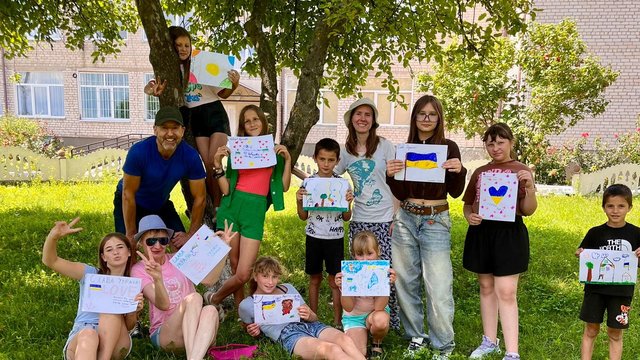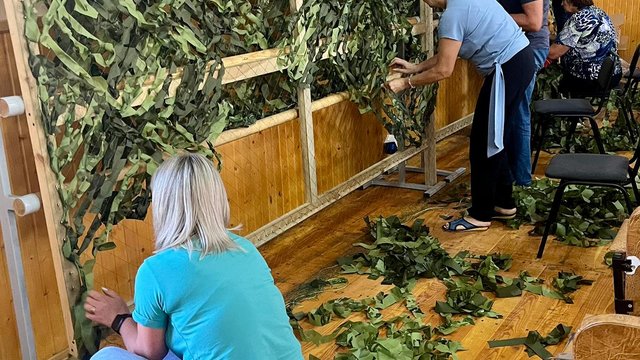Barend Leyts, former Spokesperson to the President of the European Council, became a volunteer in Ukraine: We care about Ukraine

Interview with Barend Leyts, a former Spokesperson to the President of the European Council, adviser to former Prime Minister of Belgium Alexander De Croo, who is now a humanitarian volunteer in Ukraine, to Interfax-Ukraine News Agency
Text Iryna Somer
Why did you decide to volunteer in Ukraine, and why did you choose the organization FinEst Volunteers, which is registered in Finland?
When I saw the devastation in Borodyanka and the mass grave in Bucha, I promised myself I would not remain a passive observer. I was deeply struck by the sheer injustice. Ukraine is not just fighting for its own freedom. It’s defending Europe. Our democracies. Our dignity.
I chose FinEst Volunteers because of their quiet, consistent impact. It’s a grassroots initiative from Finland and Estonia that brings together people from all over the world. They simply do the work and show up in the communities they support.
I arrived at the end of July and will stay for nearly four weeks. Every day is different but always full.
We often begin by weaving camouflage nets, then move to packing supplies: clothes or medicine, hygiene kits. Some days we teach English classes, assist at an animal shelter, or simply spend time connecting with locals.
We sleep in shared rooms, eat simple meals and keep going because the need never stops.
How did your family and friends react to this decision?
Not everyone understood. Some even called it pointless.
But my family knows that when I commit to something, I mean it. And I believe this is worth every minute. In fact, I’m more convinced now than I was when I arrived. I came to show that we still care despite the war of attrition, despite the endless drone attacks. I deeply admire the stamina of the Ukrainian people. They deserve our solidarity.
Have you made any friends? If so, who are they?
Absolutely. Volunteering brings people together quickly. There’s Nazar, a young man from Riwne in his twenties with a quiet sense of humor and eyes full of uncertainty. I saw tears in his eyes when I asked him about his plans for the future. He’d like to continue studying, but feels the pressure from peers to go and fight. His story moved me deeply. And then there’s our incredible coordinator, Tarja. She’s resourceful, determined, and leads with both heart and clarity. The volunteers here aren’t just colleagues. They’re part of a small family of resistance.

What are your relationships with the local population?
We are located in a small village near Dubno. At first, there’s a certain distance; understandably so. This is a country at war. But over time, people open up.
One day, a young woman stopped me outside a library. We’re there with a small group of volunteers, on our way to a language class. Just as I’m about to step inside, she stops me. “Your clothes give you away,” she says. “You’re European, aren’t you?” I’m momentarily thrown off. People here rarely address you so directly. Many Ukrainians keep their distance. Not out of unwillingness, but out of caution. According to our coordinator Tarja, many have withdrawn into themselves, hoping that this war will somehow end on its own. Conversations usually only happen if you speak their language or if the silence lasts long enough for a rare question to emerge.
“I’m Belgian,” I reply. “This summer, I’m volunteering. She nods. The children stream into the library, ready for class. I’m about to follow them in, but then she looks at me again. This time, with a different tone. “But do you really care?”
That question stays with me, now that Ukraine is entering its fourth year of war. Today, I’d like to believe people see that we’re not just passing through. We’re here for as long as we’re needed.
What is your opinion of Ukrainians?
Brave. Proud. There’s a quiet dignity in how Ukrainians continue. I’m often astounded by the way they go on, refusing to give in. That strength is more than survival; it’s identity. They are building a future while facing destruction. That, to me, is heroism.
How different are they from Belgians?
In some ways, we’re not so different. We value peace, family, and community. But here, the stakes are existential. For Belgians, war is something we see on TV or read about in history books. In Ukraine, it’s a daily reality. Everyone knows someone who’s fallen on the battlefield. Everyone is connected to the front line and the courageous resistance.

Based on your experience of communicating with Ukrainians, do you see this country as a member of the EU and NATO?
Ukraine is Europe. Despite the war, the country has made remarkable reforms to integrate into the European Union. Ukrainians want to belong to the European project of peace and prosperity, and we simply cannot let them down. The EU and NATO are alliances of shared values. And Ukraine lives those values, every single day.
Based on your experience in the world of politics, what are your expectations from the announced talks between President Trump and Putin?
Few people here speak openly about the war, but there is a quiet concern that international solidarity may be fading. At a veterans’ center yesterday, some soldiers shared their thoughts with us. When asked if they believed Russia might declare a ceasefire, their answer was immediate: “Not a chance. Not now. Not under this regime.” These talks won’t be about peace. They’ll be about power.
What is the mood among Ukrainians and volunteers? Why do you consider what you do important?
People are tired, yes. But they haven’t given up. Volunteers feel it too. We’re not here to save the day. We’re here to help without expecting thanks. This is a quiet revolution. Volunteering as resistance. We still care. We’re still here. And that, sometimes, is exactly what’s needed most.
Ukraine is still the place where Europe’s future is being decided. If Ukraine loses this war, we lose an ally. And perhaps the greatest proof yet that a democracy cannot defend itself. Brutal force will have won. That’s why now is the time to stay. To show that we still care. As a volunteer, you won’t solve the war. But you’re here. You pack boxes with medical supplies for soldiers on the front. You teach children, you tie metres of camouflage netting, and comfort wounded dogs in the local shelter. Sometimes, you just do what needs to be done.
I work with FinEst Volunteers, a Finnish-Estonian organisation that sends volunteers to work in Ukraine. People of all ages, from all over. We share a purpose with like-minded people from across Europe and beyond. Americans, Koreans, and Australians come to help, too. What unites us is the belief that this war will one day end and that solidarity is simply necessary.










